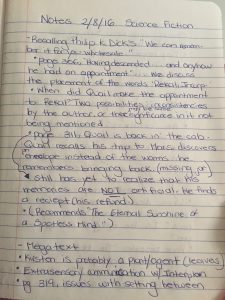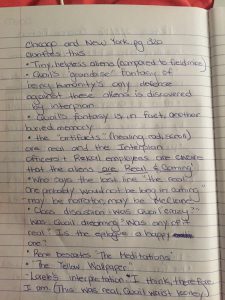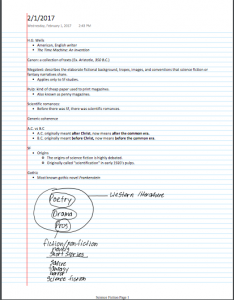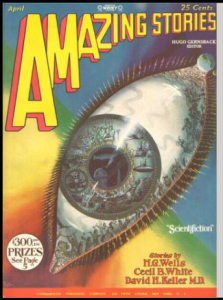- How do you define verisimilitude? [see SF Keywords post] / http://www.wwnorton.com/college/english/litweb10/glossary/V.aspx
2. Are canon and megatext synonyms? If not, how do they differ? Are they related? [see SF Keywords post and http://www.wwnorton.com/college/english/litweb10/glossary/C.aspx ]
3. How many reading journal entries should we have by now? [We are in week three of the semester, therefore, you should have at least three. However, we have read and responded to seven texts: the Wesleyan “Introduction,” “Why Do You Read Science Fiction?,” Dick’s story, Pohl’s story, Russ’s story, Delany’s story, and Delany’s essay. You may have reading journal entries for each of these texts, in which case, you’ll have seven entries.]
4. How do you define “the Golden Age” of Science Fiction? What are its characteristics? [see SF Keywords post]
5. How do you define “Next Wave” or “New Wave Science Fiction”? [see SF Keywords post]
6. How do you define novum? [see SF Keywords post]
7. How do you define cybernetic? What was the definition in 1950? What is the definition today? [see SF Keywords post]
8. In Frederick Pohl’s story “Day Million,” is the character Don a robot, or is he an augmented human?
9. Is time travel a theme? [The simple answer is: “yes.” However, the more complicated answer is much more complicated. Take a look at the SF Encyclopedia entry for a sense of the complications involved: http://www.sf-encyclopedia.com/entry/time_travel and the Norton LitWeb for a working definition of theme: http://www.wwnorton.com/college/english/litweb10/glossary/T.aspx]
10. What is the difference between the sf sub-genres of steampunk and cyberpunk? [see SF Keywords post] and sf Encyclopedia
11. Can a science fiction story belong to multiple genres? [yes. see our ongoing discussion of genre]
12. In Joanna Russ’s story “The Second Inquisition,” are the girl and the visitor related? Is the book supposed to inspire the little girl? Why did the visitor just leave?
13. What is the narrator trying to explain in the first paragraph of Joanna Russ’s story, “The Second Inquisition”?
14. Why did Professor Rodgers ask us to read the stories by Pohl and Russ? Why did she not choose to assign more interesting readings?
15. Was the narrator in Joanna Russ’s story imagining the visitor or was the visitor actually there? How might a reader’s interpretation of this question change his/her interpretation of the story? Why? Second question: If the narrator did imagine the visitor, why wouldn’t the visitor have taken her with her?
16. Is gender an issue or theme that comes up often in sf? [yes, does everyone understand the many reasons why this is the case?]
17. What is the difference between a cyborg and cybernetics?
18. What connections exist between fantasy and sf? [see our ongoing discussion of genre]
19. What did Don do in the space ship?
20. Is the visitor in Russ’s story a figment of the narrator’s imagination or is she actually a visitor from another town who happens to be traveling through time?
21. How do you define “hard sf”? Is it science fiction backed by scientific fact?
22. Does the term “man” relate to the gender or sexuality of an individual? What is the difference between gender and sexuality?
23. How old is the slipstream subgenre of sf?
24. What distinguishes the three primary “eras” of sf in the U.S. in the 20th c.?
25. What thematic connections exist between Joanna Russ’s story “The Second Inquisition” and Frederick Pohl’s story “Day Million”? What other types of connections exist between the two stories, i.e., specific shared attributes of the characters, plot points, setting, figurative language, symbols, etc.?
26. Is there some relationship between “magical realism” and sf? [yes: http://www.sf-encyclopedia.com/entry/magic_realism ]
Five categories of questions:
1/ definitions of literary terms
2/ definitions of SF terms
3/ questions related to Russ’s and Pohl’s stories
4/ discussion questions related to reading and interpreting science fiction texts
5/ questions about course assignments









